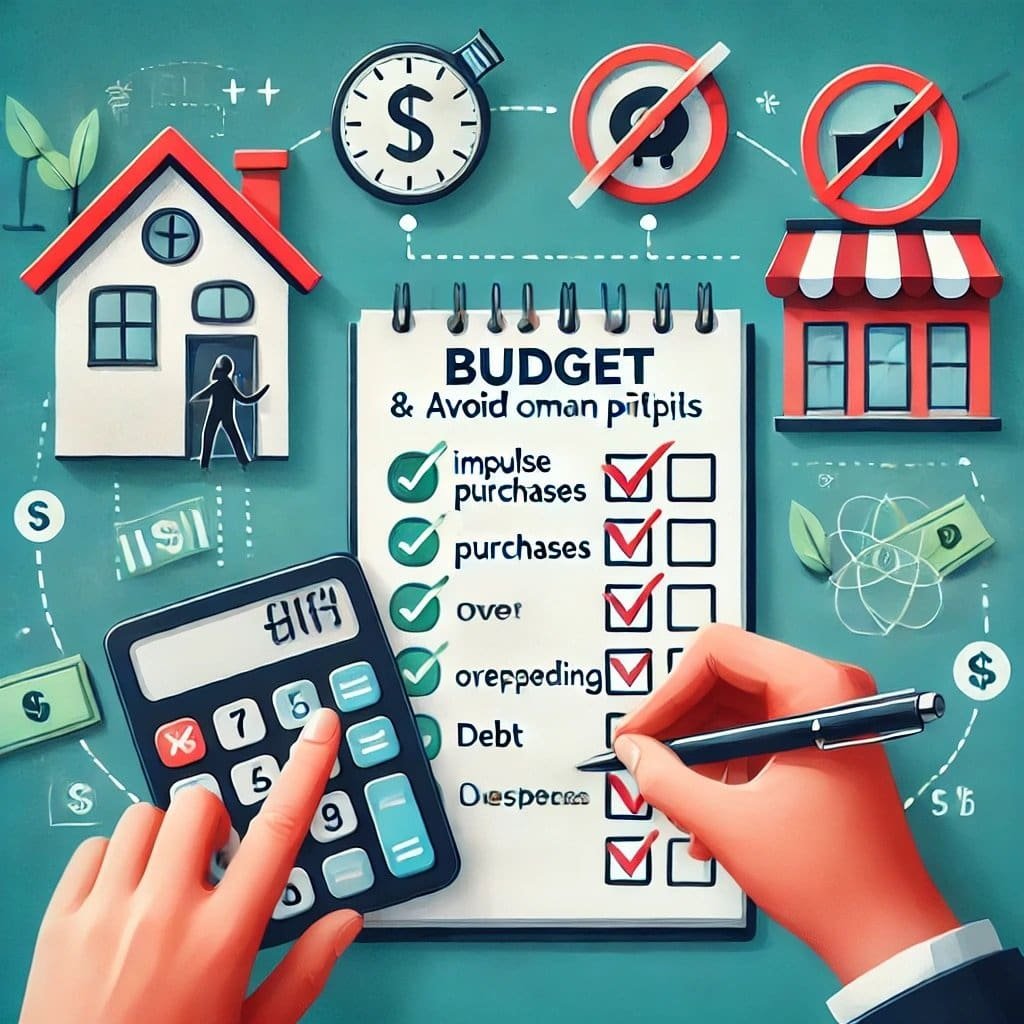Creating a budget is the first step toward financial control, but sticking to it is where the real challenge lies. Many people struggle to maintain their budgets due to common pitfalls such as overspending, impulsive purchases, or unexpected expenses. However, with discipline, planning, and the right strategies, you can stay on track and achieve your financial goals. Here’s how you can stick to your budget and avoid common pitfalls along the way.
Key Steps to Sticking to Your Budget
1. Set Realistic and Flexible Goals
One of the most common reasons people fail to stick to a budget is setting unrealistic goals. If your budget is too restrictive, it can lead to frustration and overspending. Instead, set realistic targets that reflect your actual income, expenses, and lifestyle. Leave room for flexibility to accommodate occasional splurges or unexpected costs.
• Example: Allocate a small percentage of your budget (e.g., 5-10%) for discretionary spending, like entertainment or dining out, so you don’t feel deprived.
2. Track Every Expense
Tracking your expenses is crucial for maintaining financial discipline. Without knowing exactly where your money goes, it’s easy to overspend. Use budgeting apps like Mint, YNAB (You Need A Budget), or spreadsheets to monitor your daily spending. Regularly reviewing your expenses helps you identify areas where you can cut back or adjust.
• Tip: Set aside time weekly to review your budget and make any necessary adjustments.
3. Automate Your Savings
One of the most effective ways to stick to a budget is to automate your savings. By setting up automatic transfers to your savings or investment accounts, you ensure that money is saved before you have the chance to spend it. This “pay yourself first” strategy helps you stay committed to your savings goals.
• Example: Set up an automatic transfer to move 10-20% of your income into a savings account as soon as your paycheck arrives.
4. Use the Envelope System for Variable Expenses
The envelope system is a cash-based budgeting method that helps you control variable expenses, such as groceries, entertainment, or dining out. After determining how much you’ll spend in each category, withdraw that amount in cash and place it in labeled envelopes. Once an envelope is empty, you stop spending in that category until the next budget period.
• Benefit: This system encourages mindful spending and prevents you from overspending in certain categories.
5. Prioritize Needs Over Wants
A successful budget requires distinguishing between needs and wants. Needs include essential expenses like housing, food, utilities, and transportation, while wants are non-essential items like eating out, vacations, or new clothes. Always prioritize your needs, and if you have extra money after meeting your essentials, allocate it toward your wants responsibly.
• Tip: If you’re tempted to buy something impulsive, use the 48-hour rule—wait two days before making the purchase to ensure it’s something you truly need or want.
6. Prepare for Unexpected Expenses
Unexpected expenses can quickly derail your budget if you’re not prepared. Medical bills, car repairs, or home maintenance costs can arise unexpectedly, so it’s important to have an emergency fund. Set aside at least 3-6 months’ worth of living expenses to cover these surprises without dipping into your budget for everyday spending.
• Tip: Regularly contribute to your emergency fund, even if it’s a small amount each month. Over time, it will grow into a substantial safety net.
Common Budgeting Pitfalls and How to Avoid Them
1. Impulse Buying
Impulse buying is one of the biggest budget killers. It’s easy to give in to temptation, especially when you’re surrounded by online deals or in-store promotions. To avoid this, stick to a shopping list, set spending limits, and avoid browsing retail sites or visiting malls unless necessary.
• Tip: Use the “cash only” rule for discretionary spending. Leave your credit card at home and only bring cash for purchases—this will limit how much you can spend.
2. Underestimating Small Expenses
Small, seemingly insignificant purchases like coffee, snacks, or streaming subscriptions can add up quickly and blow your budget. These “invisible expenses” can often go unnoticed, but they can drain your finances over time. Keep track of these small costs to see where you can cut back.
• Tip: Review your bank and credit card statements for small recurring expenses, and decide if they’re truly necessary.
3. Not Adjusting Your Budget for Life Changes
Major life changes like getting married, having a child, moving, or starting a new job can affect your income and expenses. If you don’t adjust your budget accordingly, you might find yourself overspending in certain areas. Always revisit your budget during significant transitions to account for new expenses or income changes.
• Example: If you get a raise, allocate part of the increase toward savings or debt repayment rather than increasing your lifestyle expenses.
4. Ignoring Debt
Budgeting is not just about managing daily expenses—it’s also about addressing long-term financial responsibilities like debt repayment. If you have high-interest debt, ignoring it can lead to compounding interest and a bigger financial burden down the road. Prioritize paying off debt as part of your budget, particularly high-interest debts like credit cards.
• Tip: Use the debt snowball or avalanche method to pay off your debts. The snowball method tackles the smallest debts first, while the avalanche method focuses on the highest-interest debts.
5. Lack of Accountability
It’s easy to lose motivation or fall back into bad spending habits if you’re not holding yourself accountable. Whether it’s reviewing your budget with a partner, using a budgeting app, or setting financial milestones, having accountability helps keep you on track.
• Tip: Share your budget goals with a trusted friend or family member and ask them to check in on your progress regularly.
Tips for Long-Term Budget Success
• Review and Adjust Regularly: Your budget is not a set-it-and-forget-it tool. Review it regularly—monthly or quarterly—to ensure it aligns with your financial goals. Adjust it as needed based on changes in your income, expenses, or life events.
• Reward Yourself: Budgeting shouldn’t be about depriving yourself. Celebrate small wins by rewarding yourself when you hit certain milestones, like saving a certain amount or paying off debt. Just make sure your reward fits within your budget.
• Plan for Big Purchases: If you’re planning a vacation, buying a car, or making a large purchase, include these goals in your budget. Set aside money each month so that when the time comes, you can pay in full without going into debt.
Conclusion
Sticking to a budget can be challenging, but by setting realistic goals, tracking your expenses, and avoiding common pitfalls, you can maintain financial discipline and work toward your financial goals. Budgeting isn’t about restricting yourself; it’s about managing your money in a way that aligns with your priorities and enables long-term financial success. Stay committed, adjust when needed, and reward yourself for staying on track.



4 comments